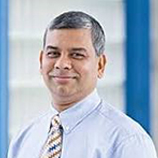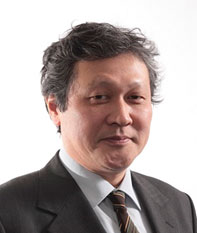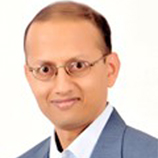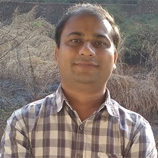
Koenig Endowed Chair Professor, Electrical and Computer Engineering
Director, Computational Optimization and Innovation (COIN) Laboratory
Michigan State University, USA
Kalyanmoy Deb is University Distinguished Professor and Koenig Endowed Chair Professor at Department of Electrical and Computer Engineering in Michigan State University, USA. Prof. Deb's research interests are in evolutionary optimization and their application in multi-criterion optimization, modeling, and machine learning. He has been a visiting professor at various universities including University of Skövde in Sweden, Aalto University in Finland, Nanyang Technological University in Singapore, and IITs in India. He was awarded IEEE Evolutionary Computation Pioneer Award for his sustained work in EMO, Infosys Prize, TWAS Prize in Engineering Sciences, CajAstur Mamdani Prize, Distinguished Alumni Award from IIT Kharagpur, Edgeworth-Pareto award, Bhatnagar Prize in Engineering Sciences, and Bessel Research award from Germany. He is fellow of IEEE, ACM, ASME, and three Indian science and engineering academies. He has published over 610 research papers with Google Scholar citation of over 189,000 with h-index 134. He is in the editorial board on 10 major international journals. More information about his research contribution can be found from https://www.coin-lab.org.
Title: Breaking the Billion Variable Barrier in Evolutionary Computation
Abstract: Evolutionary algorithms (EAs) have been developed and applied in search and optimization problems for more than 38 years since the first international conference on genetic algorithms. Scalability of EAs have been regularly criticized by competing fields, simply because of the lack of mathematical rigor with which EAs are usually applied. Such a criticism is not fair, since there cannot exist any algorithm (EA or classical) with a convergence proof with bounded complexity to find the true optimum in an arbitrary problem. However, we argue in this talk that due to the ease of customization and their implicit parallel processing, EAs are potential to be applied to very large-scale problems. In this lecture, we consider an operations research problem originated from an industry and propose a customized recombinative EA which is able to find near-optimal solutions from 50,000 to a staggering one billion version of the practical problem, compared to well-known classical optimization methods which can solve only up to 1,800 variable version of the problem. Explanations for EA's superior performance will motivate EA researchers to pursue more such large-scale studies and encourage classical optimization researchers to pay more attention to EAs.

Professor, Department of Electrical Engineering and Information Systems
The University of Tokyo, Japan
Akira Hirose received the Ph.D. degree in electronic engineering from the University of Tokyo in 1991. In 1987, he joined Research Center for Advanced Science and Technology (RCAST), the University of Tokyo, as Research Associate. In 1991, he was appointed as Instructor at RCAST. From 1993 to 1995, on leave of absence from the University of Tokyo, he joined the Institute for Neuroinformatics, University of Bonn, Bonn, Germany. He is currently Professor with the Department of Electrical Engineering and Information Systems, the University of Tokyo. The main fields of his research interests are wireless electronics and neural networks. In the fields, he published several books such as Complex-Valued Neural Networks, 2nd Edition (Springer 2012). He served as the Founding President of Asia-Pacific Neural Network Society (APNNS) (2016), President of Japanese Neural Network Society (JNNS) (2013-2015), Vice President of the IEICE Electronics Society (ES) (2013-2015), Editor-in-Chief of the IEICE Transactions on Electronics (2011-2012), Associate Editor of journals such as the IEEE TRANSACTIONS ON NEURAL NETWORKS (2009-2011), IEEE GEOSCIENCE AND REMOTE SENSING NEWSLETTER (2009-2012), Chair of the Neurocomputing Technical Group in the IEICE, Founding Chair of the IEEE CIS NNTC Complex-Valued Neural Network Task Force (2010-), Governing Board Member of APNNA/APNNS (2006-), IEEE Geoscience and Remote Sensing Society (GRSS) All Japan Chapter Chair (2013-2015) and IEEE Computational Intelligence Society (CIS) All Japan Chapter Chair (2017- 2018). He also served as the General Chair of Asia-Pacific Conference on Synthetic Aperture Radar (APSAR) 2013 Tsukuba, International Conference on Neural Information Processing (ICONIP) 2016 Kyoto, and International Geoscience and Remote Sensing Symposium (IGARSS) 2019 Yokohama. Dr. Hirose is a Fellow of the IEEE and the IEICE, and a member of JNNS and APNNS.
Title : Recent Progress in Neural Network Signal Processing in Earth-Observation Remote Sensing and Ground Penetrating Radars
Abstract : This keynote discusses recent topics in the theory and applications of neural-network artificial intelligence (AI) in earth observation remote sensing and ground penetrating radars. First, we look over broad general research trends. Then we pick up some topics by focusing on their essence, ideas, and practical effects. Lastly, we look forward into future developments.
Index Terms Explainability, quaternion neural network, phasor quaternion, phasor quaternion self-organizing map

Professor of Computer Science and Oden Institute of Computational Engineering and Sciences
The University of Texas at Austin, USA
Prof. Bajaj’s current research is on the computer science and computational mathematics foundations of statistical and dynamic decision making, learning dynamical systems and exploratory visualization. He develops machine learning and geometric optimization algorithms for applications in the physical, chemical, health and environmental data sciences, medicine and neuro-morphic computing. Prof. Bajaj revisits his past research in modeling multi-scale form and function, through the lens of inferential data sciences. Prof. Bajaj’s current research projects include (a) forward and inverse optimization problems in microscopy, spectroscopy, electro-magnetic and electro-optical wide spectrum imaging; (b) generative shape and new material design for spatially realistic and phenomenological models; (c) learning from nature and generating models and mechanisms with accelerated and emergent properties. He also teaches an undergraduate course titled “Geometric Foundations of Data Sciences” and a graduate course titled “Predictive Machine Learning”. Prof. Bajaj has courtesy appointments and supervise undergraduates, M.S. and Ph.D. students from several UT departments, including biomedical and electrical engineering, neuroscience, and mathematics.
The following is a link to his most cited publications:
http://scholar.google.com/citations?user=gyL3CZ0AAAAJ"&user=gyL3CZ0AAAAJ
Title: Principled Learning to Model our Dynamic Environments
Abstract: Can computers be programmed to learn to model progressive approximations of the underlying dynamical processes of specific environments, through interaction (i.e. spatio-temporal sensing) . We answer this in the affirmative with a proviso that not all the Hamiltonian models of environmental processes are learnable at optimal fidelity. Computers equipped with stable numerical solvers (some, possibly simultaneously learnable), are at the mercy of the noise and uncertainty of the sensed environmental observations. can nevertheless be programmed to stably train, cross-validate and test stochastic PDE (partial differential equation) neural operators. The learning is along optimally controlled pathways that satisfy a form of the Hamilton-Jacobi-Bellman equation. In this talk, I shall explain a framework of learning Hamiltonian models (Hamiltonians) as a partially observable controlled Markov decision process model (COMDP) and based on the Pontryagin's maximum principle. The COMDP model learning trajectory operates on a constrained manifold that satisfy the conservation laws of the underlying physics, via application of Noether's theorem. The COMDP includes learning dynamic stabilizing control satisfying learned Lyapunov functions for error bounded, convergent solutions, and additionally produces sparse approximations that avoid overfitting This talk shall show a few examples of such learned spatio-temporal models of dynamic environments, with various approximations of dynamic shape and function .
This is joint work with my students Taemin Heo, Minh Nguyen, Yi Wang.

Global Head, NVIDIA AI Technology Centre, Singapore
Prof. Simon See is the Global Head, NVIDIA AI Technology Centre, Singapore. He is also a renowned Professor and Chief Scientific Computing Officer in Shanghai Jiao Tong University. Prof. Simon See is also the Adjunct Professor of the Department of Computer Science & Engineering, Mahindra University. He is currently involved in a number of smart city projects, especially in Singapore and China. His research interests are in the area of High Performance Computing, Big Data, Artificial Intelligence, machine learning, computational science, Applied Mathematics and simulation methodology. Prof. See is also leading some of the AI initiatives in Asia Pacific.
He has published over 200 papers in these areas and has won numerous awards in the field. Prof. See is also a member of SIAM, IEEE and IET. He is also a committee member of more than 50 conferences.
Prof. See graduated from University of Salford (UK) with a PhD in electrical engineering and numerical analysis in 1993. Prior to joining NVIDIA, Dr. See worked for SGI, DSO National Laboratory of Singapore, IBM, International Simulation Ltd (UK), Sun Microsystems and Oracle. He is also providing consultancy to a number of national research and supercomputing centres.
Title: Is AI - Artificial Intelligence or Alien Intelligence or Augmented Intelligence?

Bhagat Singh Rekhi Chair Professor, Department of Computer Science & Engineering, IIT Bombay
FNAE, Abdul Kalam Fellow
Former Director, IIT Patna
Distinguished Alumnus, IIT Kharagpur
Former President Association for Computational Linguistics
Former Vijay and Sita Vashee Chair Professor, IIT Bombay
Prof. Pushpak Bhattacharyya (http://www.cse.iitb.ac.in/~pb ) is Bhagat Singh Rekhi Chair Professor of Computer Science and Engineering at IIT Bombay. He has done extensive research in Natural Language Processing and Machine Learning. Some of his noteworthy contributions are Indian Langauge NLP like IndoWordnet, Cognitive NLP, Low Resource MT, and Knowledge Graph-Deep Learning Synergy in Information Extraction and Question Answering. He has published close to 400 research papers (https://scholar.google.co.in/citations?user=vvg-pAkAAAAJ&hl=en more than 12K citations and h-index 52), has authored/co-authored 6 books including a textbook on machine translation, and has guided more than 350 students for their Ph.D., Masters, and Undergraduate thesis. Prof. Bhattacharyya is a Fellow of the National Academy of Engineering, Abdul Kalam National Fellow, Distinguished Alumnus of IIT Kharagpur, ex-Director IIT Patna, and past President of ACL (Association of Computational Linguistics).
Title: Natural Language Processing for Health
Abstract: Health sector is in dire need of AI today, caused by the pressures of scalability, robustness, health practitioners' fatigue, and so on. The use of AI in the health sector is not new, though. The oft-cited MYCIN system developed at Stanford in the 70s is an expert system for assisting in the diagnosis of blood infections. In the current presentation, we report our preliminary studies and NLP-systems development in both physical and mental spheres. We have used NLP and ML for automated report generation from radiologists' dictation as well as from chest X-ray images. In the mental space, we have created virtual agents to help with agony appeasement and depression tracking. The content of the talk is based on publications in top conferences and journals.

Professor and Canada Research Chair (CRC) in Computational Intelligence
Department of Electrical and Computer Engineering
University of Alberta, Edmonton, Canada.
Prof. Witold Pedrycz (IEEE Fellow, 1998) is a Professor and Canada Research Chair (CRC) in Computational Intelligence in the Department of Electrical and Computer Engineering, University of Alberta, Edmonton, Canada. He is also with the Systems Research Institute of the Polish Academy of Sciences, Warsaw, Poland. In 2009 Dr. Pedrycz was elected as a foreign member of the Polish Academy of Sciences. In 2012 he was elected as a Fellow of the Royal Society of Canada. Prof. Witold Pedrycz has been a member of numerous program committees of IEEE conferences in the area of fuzzy sets and neurocomputing. In 2007 he received a prestigious Norbert Wiener award from the IEEE Systems, Man, and Cybernetics Society. He is a recipient of the IEEE Canada Computer Engineering Medal, a Cajastur Prize for Soft Computing from the European Centre for Soft Computing, a Killam Prize, and a Fuzzy Pioneer Award from the IEEE Computational Intelligence Society. His main research directions involve Computational Intelligence, fuzzy modeling and Granular Computing, knowledge discovery and data mining, fuzzy control, pattern recognition, knowledge-based neural networks, relational computing, and Software Engineering. He is an author of 15 research monographs covering various aspects of Computational Intelligence, data mining, and Software Engineering. He also published over 455 research papers with Google Scholar citation of over 86,000 with h-index 125. Dr. Pedrycz is intensively involved in editorial activities. He is an Editor-in-Chief of Information Sciences, Editor-in-Chief of WIREs Data Mining and Knowledge Discovery (Wiley), and Int. J. of Granular Computing (Springer). He currently serves on the Advisory Board of IEEE Transactions on Fuzzy Systems and is a member of a number of editorial boards of other international journals.
Title : Interpretability and Credibility in Machine Learning: A Perspective of Granular Computing
Abstract : Over the recent years, we have been witnessing numerous and far-reaching developments and applications of Machine Learning (ML). Efficient and systematic design of their architectures is important. The two factors that are of paramount relevance to the successes of ML and its broad acceptance by the society involve endowing such ML models with tangible facets of their interpretability/explainability and credibility. Interpretability and explainability are the crucial capability of the model to deliver the results in a comprehended format easily understood by the user. The credibility of ML models is of concern to any application, especially the one exhibiting a high level of criticality commonly encountered in autonomous systems. With this regard, there are a number of burning questions that need to be posed and addressed: how to quantify the quality of a result produced by the ML model? What is its credibility? How to equip the models with some self-awareness mechanism so careful guidance for additional supportive experimental evidence could be triggered?
Proceeding with a conceptual and algorithmic pursuits, we advocate that these quests could be posed and formalized in the settings of Granular Computing. With regard to explainability, it is shown that interpretability entails results coming in the form of information granules, which support comprehension of findings. In terms of credibility, we note that any numeric result can be augmented by the associated information granules and the quality of the results is expressed in terms of the characteristics of information granules such as coverage and specificity. Different directions are covered including confidence/ prediction intervals, granular embedding of ML models, and granular Gaussian Process models.
Several representative approaches are discussed within the realm of rule-based computing.

Senior Consultant, TCS Innovation Labs, TATA Consultancy Services
Hyderabad, India
Sanjay P. Bhat received the B.Tech. degree in aerospace engineering from the Indian Institute of Technology, Bombay, in 1992, and the M.S. and Ph.D. degrees in aerospace science from the University of Michigan, Ann Arbor, in 1993 and 1997, respectively. He taught at the Department of Aerospace Engineering, Indian Institute of Technology, Bombay, for ten years before joining TCS Research, where he leads a team of researchers working on applying learning techniques to sequential decision-making problems. His research work spans stability theory, nonlinear systems theory, dynamics and control of rotational motion, stochastic processes, and sequential decision-making problems.
Title: A Potpourri of Pricing Problems
Abstract: A pricing problem is the problem of determining the price of an asset or a commodity. The criteria that drive the determination of price can range across fairness, social welfare and revenue (or profit) maximization. We present a selection of pricing problems from the domains of finance, retail commerce and energy trading. We outline the main considerations, mathematical frameworks and key ideas that arise in each of the problems that we present. We also touch upon data-driven approaches to some of the problems that we consider.

Senior Scientist, Nuclear Power Corporation of India Limited – Bhabha Atomic Research Centre
Department of Atomic Energy, Government of India
Dr. Lalit Kumar Singh received his Ph.D. degree from Indian Institute of Technology (Banaras Hindu University). He is currently a Scientist in NPCIL-BARC, Department of Atomic Energy, Government of India, since 20 years, and has distinction of working on Pressurized Heavy Water Reactors (PHWR) and Light Water Reactors (LWR). He has an illustrious career and succeeded in several critical and challenging jobs assigned to him. His assignments over the years range from design, development, testing, IV&V, related research and site validation of the safety critical computer based systems of Indian Nuclear Power Plants. He has published several research papers in high impact factor journals like IEEE Transactions, IEEE Computer, ACM, etc. He is a Senior Member of IEEE and member on the advisory Board of IEEE Industry Relations & Entrepreneurship Committee. He has been invited for chief guest, keynote speeches, session chair and talks in many international conferences, short term courses, workshops & faculty development programs from many IITs, NITs & other institutes of national importance. He is recipient of many awards like prestigious IEEE K. Shankar award, publication award, group achievement award, etc. He is a reviewer of several SCI indexed journals of high impact factor. He is a life member of Indian Nuclear Society. He is founder member and industrial coordinator of the proposed Centre of Dependability at IIT(BHU). He is in the panel of faculty assessment committee for Department of CSE, IIT Roorkee to assess their research profile and give recommendations. He is a member of editorial board of many reputed journals and guest lead editor of many special issues. He is supervising many PhD students of different IITs, NITs and is PhD thesis examiner of IITs, NITs and other reputed institutes. He is an expert member of Industrial policy formation of IIT Ropar, BoS of many autonomous institutes and member on the advisory board of many institutes/universities. He is a reviewer and project collaborator of Research proposals of Board of Research in Nuclear Sciences (BRNS). He is also faculty of Nuclear Training Centre, Department of Atomic Energy, Government of India. He is interfacing with other countries, like Russia, USA, France, etc. for importing nuclear reactors that are based on frontline technologies. His research interests are in the area of reliability, safety and security of safety critical computer based systems. So far, he has completed 33 projects of Department of Atomic Energy, Government of India. His publications have received more than 550 citations.
Title : Design Verification of Safety Critical Cyber Physical Systems
Abstract : Cyber Physical Systems are the nervous system of a nuclear power plant. They monitor all facets of the plant's health and help respond with care and adjustments needed, thus ensuring goals of efficient power production and safety. Due to the safety significance of I&C, it becomes increasingly important to have a design verification methodology which ensures I&C systems are fully functional. The strategy that would be presented is the system modeling for design verification using Petri Net, converting it into Markov Chain and solving the linear system mathematically. It also exploits the best attribute of the created Markov model.

Professor of Computer Science
International Institute of Information Technology, Hyderabad (IIITH), India
Prof. Ponnurangam Kumaraguru ("PK") is a Professor of Computer Science at IIIT-Hyderabad. He is an Associate Researcher at Robert Bosch Centre for Data Science & AI - IIT Madras, Visiting Faculty at IIT Kanpur and an Adjunct faculty at IIIT Delhi. PK was inducted an ACM Distinguished Member in 2021. PK is an ACM India Council Member, and Chair of the Publicity & Membership Committee of ACM India. PK is a TEDx and an ACM Distinguished & ACM India Eminent Speaker. PK received his Ph.D. from the School of Computer Science at Carnegie Mellon University (CMU). His Ph.D. thesis work on anti-phishing research at CMU contributed in creating an award-winning startup - Wombat Security Technologies, wombatsecurity.com. Wombat was acquired in March 2018 for USD 225 Million. PK was listed in the World's 2% Scientists by Stanford University in Nov 2020. He is a senate member of IIIT Una, LNMIIT and is on various Board of Studies / Academic Council of different institutes across the country. He has co-authored research papers in the field of Computational Social Science, Privacy and Security in Online Social Media, Cyber Security, Social Computing, Data Science for Social Good, amongst others. In addition to his contributions to academia, PK is on advisory role on various government organizations, government committees, including a 8 member committee on Non-Personal Data by Government of India, chaired by Mr. Kris Gopalakrishnan. PK and his students have played an integral role in developing a technology used by many State and Central Government agencies in India. PK's research work regularly gets featured on news media, including print, online, and TV within India and across the world; to list a few, BBC, CBC, CBS, CNN, Doordarshan, Economic Times, Indian Express, NBC, New Scientist, NewYorker, Reuters, Times of India, USA Today (on 1st Feb 2021), Washington Post, and many more. PK Spear heads ACM India's programs on improving the quality of PhD students in Computing in India -- PhDClinic & Anveshan Setu Fellowship. In his Dean's role, he managed a team of 15 faculty members and 10+ admin staff, including Associate Dean of Student Affairs, overseeing hostel, sports centre, health centre, student {well-being, clubs, mentorship program}, technical & cultural fests. He was the Founding Head of Cybersecurity Education and Research Centre (CERC) at IIIT-Delhi. PK started and successfully manages PreCog (precog.iiit.ac.in), a research group at IIIT-Hyderabad.
Title : Data Science for Social Good: #LegalNLP #AlgorithmicBias #ResponsibleAI
Abstract : With increase in sage of the Internet, social media platforms and other online sources, huge amount of data is getting generated at various level; one of the dire need of the hour is to see how we can use this data to have societal impact. I will briefly mention some super cool projects that we have worked on and that have made some visible contributions to the world outside academia. All work presented in the talk (including datasets, code, slides, recorded videos) has related publications at https://precog.iiit.ac.in/ Projects that I will touch upon are — Analysis of Lower court cases, bail prediction using court documents; biases in the data, algorithms, and some instances where we have measured the biases; analysing social media data for drug consumption, including data from Reddit; analysing Spotify data to measure depression among listeners, linking online and offline behaviour of users. We all understand, many real world problems cannot be addressed by a single domain faculty / researcher, we need more students & faculty to come together, hoping to generate some interest to join hands to have an impact and make a difference. Many of our research work is made available for public use through tools or online services at https://precog.iiit.ac.in/ including datasets that we have used in our research work. Our work derives techniques from Computational Social Science, Data Science, Statistics, and Network Science. I will be more than happy to clarify, discuss, any of our work in detail, as required, after the talk.
